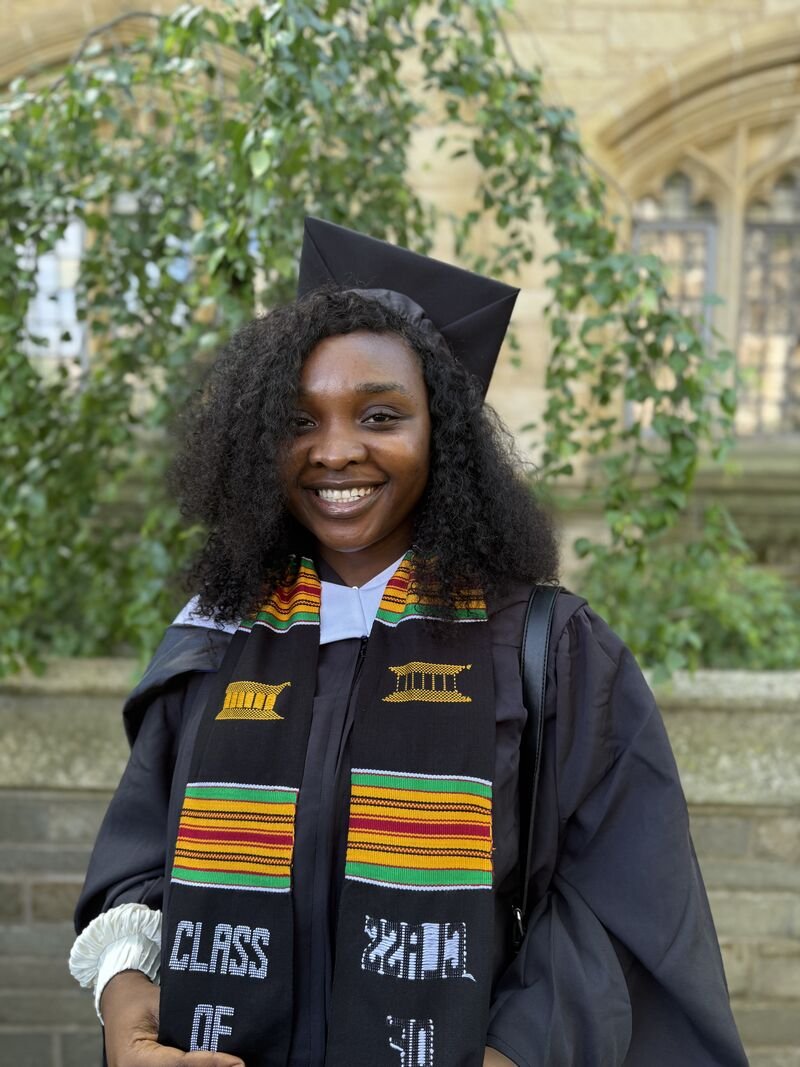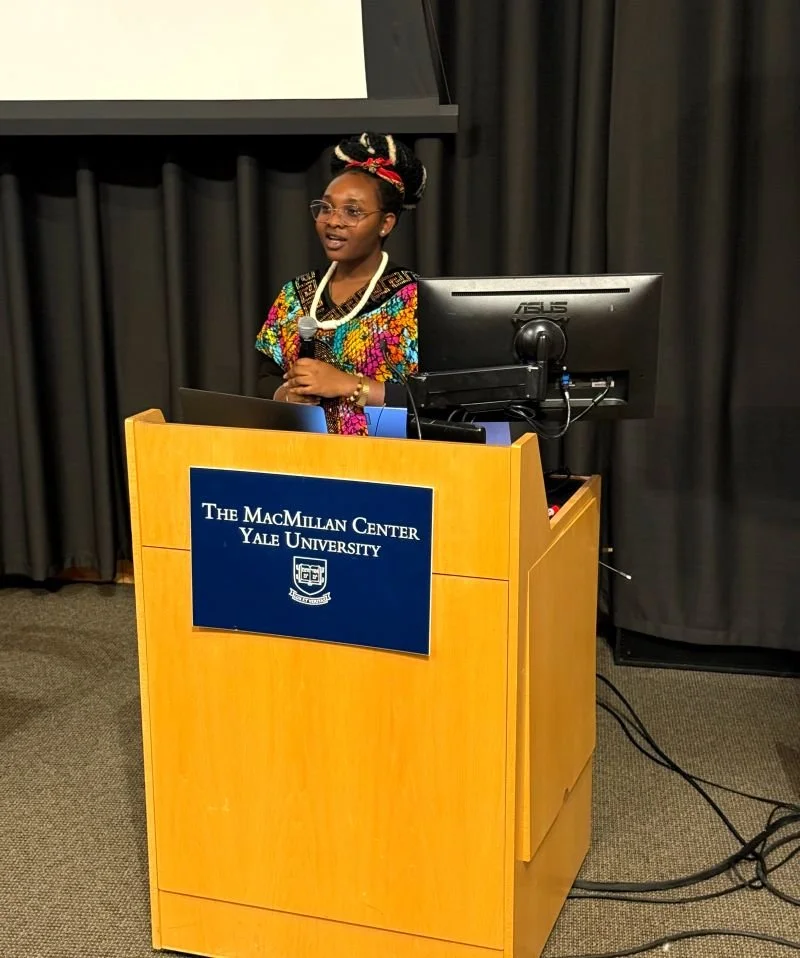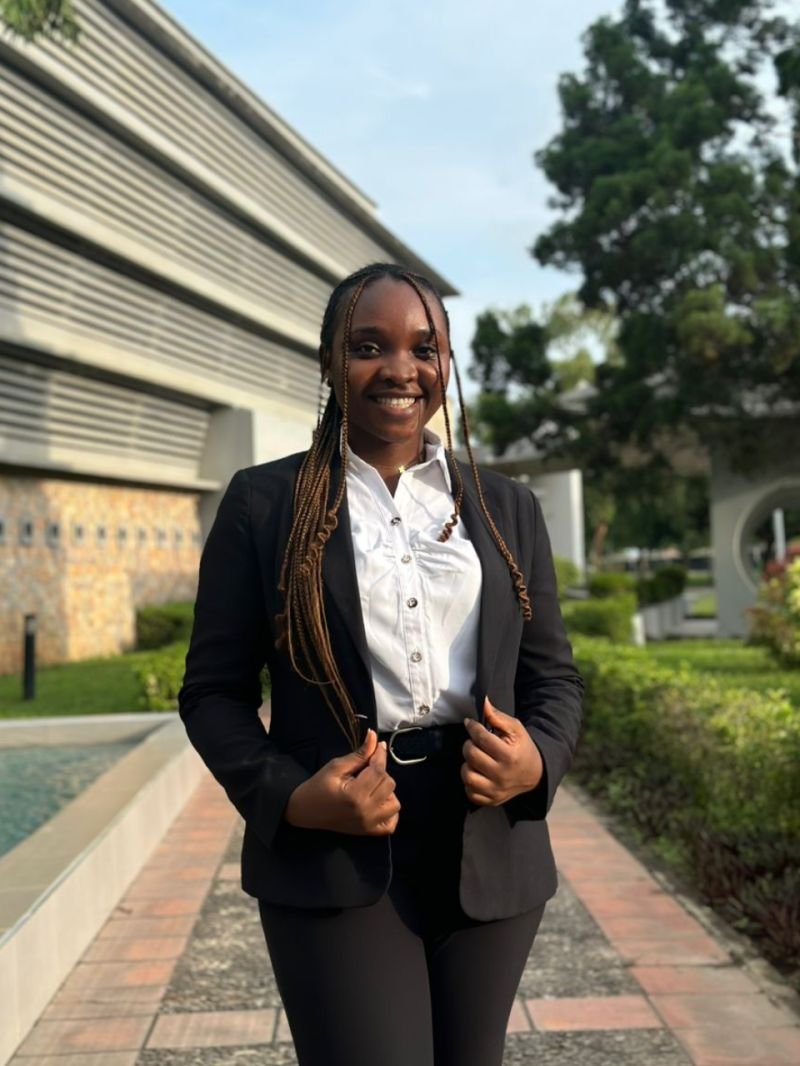GAIN Alumni Spotlight Series: Jennifer Agbo on applying to graduate school
In this post, you can follow Jennifer Amarachi Agbo’s graduate school application journey, organized around 8 essential questions that cover the most important things to know when applying to graduate school. It offers clear and practical guidance for anyone preparing their own applications.
GAIN Alumna Jennifer Amarachi Agbo
GAIN Alumna: Jennifer Amarachi Agbo
My name is Jennifer Amarachi Agbo, and I recently graduated with a Master’s in International and Development Economics from Yale University. I hold a BSC in Economics from the University of Nigeria, and I worked at Lagos Business School in Nigeria before moving to the US. I currently work as a Research Professional at the Climate Impact Lab, part of the Energy Policy Institute at the University of Chicago (EPIC). I was a GAIN mentee in the 2023/2024 cohort, and I had access to numerous resources, both financial and non-financial. I was assigned a mentor, an Assistant Professor of Economics at one of the schools in the US. I am writing to share my story and, hopefully, inspire and encourage anyone interested in applying to graduate school.
Organizing Information
How did you handle the amount of information available and how did you stay organized?
I wrote my final-year BSc exams in December and began exploring graduate school options in January without any knowledge of the process. I started by following people on LinkedIn and asking questions, but soon became overwhelmed by the sheer volume of information. I learned about the many hidden pre-application costs, including application fees, standardized tests, transcripts, etc., which can easily exceed $1,000. GAIN’s support reduced many of these costs. As a recent graduate with limited funds, I knew I needed structure and support. During one of my research sessions, I discovered GAIN, which changed my approach. Through their webinars, templates, and community, I learned how to manage information effectively and stay on track. Also, getting to know others who were on the same journey gave me motivation and confidence, and GAIN’s mentorship program helped me stay accountable. To stay organized, I created an Application Tracker, which is a spreadsheet listing schools, deadlines, requirements, referees, and waiver options. I also learned about fee waivers and started applying for them early. These first steps reduced my stress significantly and kept me focused throughout the process. (A quick note from GAIN: You can find a GAIN Application Tracker template on our resources page here).
Letters of Recommendation
How did you think about your choice of recommenders and what helped you make the process smoother for them?
I was very intentional in choosing my recommenders. I focused on people who had closely supervised my academic or research work and could write with depth and sincerity about my intellectual growth, analytical skills, and character. Rather than selecting the most senior professors, I prioritized those who genuinely knew my work. I reached out to supervisors who had seen me take initiative on projects and could attest to my problem-solving and tenacity, as well as to professors, lecturers, or research mentors who guided my thesis or taught me at some point. I contacted them well in advance, about two months before deadlines, to confirm their availability. I shared a detailed package including my updated CV, a statement of purpose, a list of programs and deadlines, and a short bullet-point outline that reminded them of the projects we worked on together and the qualities we brought to them. I prompted them to emphasize skills like research independence, quantitative skills, and resilience. I also followed up politely as deadlines approached and sent thank-you notes afterward.
GAIN Alumna Jennifer Amarachi Agbo
Academic CV vs. Résumé
In what ways does an academic CV differ from a standard résumé and which parts tend to carry the most weight?
I first learned that an academic CV differs from a résumé when I began applying for scholarships and graduate programs. Unlike a professional résumé, which focuses on jobs and skills relevant to a specific role, an academic CV tells your academic story, showing your intellectual development, research experience, and potential for success in graduate studies. During the process, I realized that admissions committees often review your CV before even reading your SOP. That means a clear, well-structured CV can determine whether they take your application seriously. I learned to include key sections like Education, Research and Teaching Experience, Awards, Leadership, and Publications, while keeping the layout clean and concise. I believe that academic achievements, research involvement, and evidence of intellectual curiosity carry the most weight, indicating preparation for graduate-level work.
Statement of Purpose
How did you approach writing your statement of purpose and what helped you connect your experiences to your goals?
I learned early on that an SOP is about how well you connect what you have done to what you want to do next. I began early and approached it like telling a story: my past (motivation and preparation), present (academic and professional experiences), and future (goals and impact). I first created a document listing all my academic, research, and professional activities, then filtered them for those that best aligned with the program I was applying to. I focused on showing growth, curiosity, and a clear sense of direction rather than listing every accomplishment. I also studied the SOP guidelines of my target universities, reviewed examples from successful applicants, and reached out to current students for feedback. I followed a simple framework (i.e., Introduction–Body–Conclusion) and also the Situation Task Action Result (STAR) approach. I made sure my goals were specific, measurable, and realistic, and I wrote honestly and revised multiple times.
GAIN Alumna Jennifer Amarachi Agbo at Yale
Feedback and Revision
How did you find people to review your materials and what helped you incorporate their feedback effectively?
I began by writing my best possible draft before sending it out because reviewers can only improve what already exists. Then I carefully chose 2–3 people at a time: recent admits to my target programs, professors or mentors in my field, and scholarship alumni who understood what committees look for. I found most of them through my existing network, LinkedIn, and alumni pages, and I always sent a polite, concise request explaining the program, my goals, and what kind of feedback I needed (e.g., content, tone, or structure). To stay organized, I created a Google Drive folder with subfolders for each document (SOP, CV, LOR) and separate versions for each reviewer, clearly named (e.g., Jennifer_Agbo_SOP_for_Musa_V1). This helped me keep track of all comments and compare them without losing my voice. When feedback came in, I merged only what aligned with my story and goals, thanked every reviewer, and saved previous versions in case I needed to revisit ideas.
Standardized Tests
How did you decide whether to take standardized tests and what guided your preparation approach?
I started by carefully checking each school’s website and tracking which programs required, waived, or made the tests optional. For schools that accepted English proficiency waivers because I studied in English, I confirmed this directly with the admissions office before paying for any test. Once I confirmed which tests were necessary, I created a reverse timeline, starting from the application deadline and working backward to plan study milestones. I gave myself at least three months for GRE preparation and about six to eight weeks for English proficiency tests like IELTS or TOEFL. I treated prep like a part-time class, studying 1–2 hours daily and taking full-length mock exams every weekend to build endurance. To stay focused, I used only a few high-quality resources. I tracked my progress, identified weak areas, and added a two-week buffer before deadlines in case I needed a retake.
GAIN Alumna Jennifer Amarachi Agbo
Submission Process
How did you manage the final stage of your applications and handle the pressure of deadlines?
Before submitting, I revisited every program’s website to verify word limits, document formats, and any additional essays. I also double-checked that my recommendation letters, test scores, and transcripts were submitted on time and followed up politely with my referees when necessary. All my documents were saved as PDFs with clear file names (e.g., Jennifer_Agbo_SOP_Yale.pdf), and I aimed to submit at least a week before deadlines to avoid portal crashes or time zone errors. To reduce stress, I treated the final week like quality control rather than a writing sprint. I reviewed everything calmly, ensured my tracker was color-coded and up to date, and kept all confirmation emails in one folder.
Interviews and Decisions
How did you prepare for interviews, and what helped you navigate outcomes such as offers or rejections?
I prepared by going back to my own story: why I applied, what genuinely excites me about the field, and how my experiences influenced that. I practiced with mentors and friends who did not sugarcoat their feedback. I recorded myself a few times, noticed where I rambled, and worked on sounding clear but still natural. I also researched my interviewers and programs so I could connect my interests to their work in a real way, not with buzzwords. I celebrated the wins but also treated rejections as feedback, not failures. Thank God, everything went well, and I was accepted to Yale University and the University of Cambridge for Fall 2024. At last, perseverance paid off. To you who are reading the post, I hope you hold tight and keep working smart.




